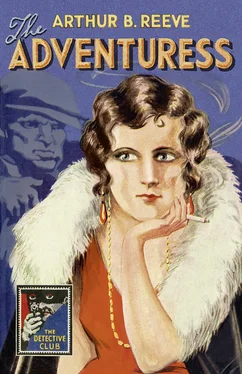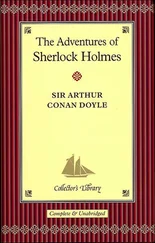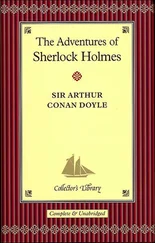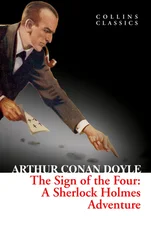Now and then Kennedy would break in with a question to Hastings, showing that his mind was actively at work on the case, but by his manner I could see that he was eager to get on the spot before all that he considered important had been messed up by others.
Hastings hurried us directly from the train to the little undertaking establishment to which the body of Marshall Maddox had been taken.
A crowd of the curious had already gathered, and we pushed our way in through them.
There lay the body. It had a peculiar, bloated appearance and the face was cyanosed and blue. Maddox had been a large man and well set up. In death he was still a striking figure. What was the secret behind those saturnine features?
‘Not a scratch or a bruise on him, except those made in handling the body,’ remarked the coroner, who was also a doctor, as he greeted Kennedy.
Craig nodded, then began his own long and careful investigation. He was so busily engaged, and I knew that it was so important to keep him from being interrupted, that I placed myself between him and those who crowded into the little room back of the shop.
But before I knew it a heavily veiled woman had brushed past me and stood before the body.
‘Irene Maddox!’ I heard Hastings whisper in Kennedy’s ear as Craig straightened up in surprise.
As she stood there there could be no doubt that Irene Maddox had been very bitter toward her husband. The wound to her pride had been deep. But the tragedy had softened her. She stood tearless, however, before the body, and as well as I could do so through her veil I studied her face. What did his death mean to her, aside from the dower rights that came to her in his fortune? It was impossible to say.
She stood there several minutes, then turned and walked deliberately out through the crowd, looking neither to the right nor to the left. I found myself wondering at the action. Yet why should she have shown more emotion? He had been nothing to her but a name—a hateful name—for years.
My speculation was cut short by the peculiar action of a dark-skinned, Latin-American-looking man whose face I had not noticed in the crowd before the arrival of Mrs Maddox. As she left he followed her out.
Curious, I turned and went out also. I reached the street door just in time to see Irene Maddox climb into a car with two other people.
‘Who are they?’ I asked a boy standing by the door.
‘Mr and Mrs Walcott,’ he replied.
Even in death the family feud persisted. The Walcotts had not even entered.
‘Did you know that the Walcotts brought Mrs Maddox here?’ I asked Hastings as I returned to Kennedy.
‘No, but I’m not surprised,’ he returned. ‘You remember I told you Frances took Irene’s part. Walcott must have returned from the city as soon as he heard of the tragedy.’
‘Who was that sallow-faced individual who followed her out?’ I asked. ‘Did you notice him?’
‘Yes, I saw him, but I don’t know who he can be,’ replied Hastings. ‘I don’t think I ever saw him before.’
‘That Latin-American?’ interposed Kennedy, who had completed his first investigation and made arrangements to co-operate with the coroner in carrying on the autopsy in his own laboratory. ‘I was wondering myself whether he could have any connection with Paquita. Where is she now?’
‘At the Harbour House, I suppose,’ answered Hastings—‘that is, if she is in town.
Kennedy hurried out of the establishment ahead of us and we looked down the street in time to see our man headed in the direction the Walcott automobile had taken.
He had too good a start of us, however, and before we could overtake him he had reached the Harbour House and entered. We had gained considerably on him, but not enough to find out where he went in the big hotel.
The Harbour House was a most attractive, fashionable hostelry, a favourite run for motor parties out from the city. On the water-front stood a large, red-roofed, stucco building known as the Casino entirely given over to amusements. Its wide porch of red tiles, contrasting with the innumerable white tables on it, looked out over the sheltered mouth of Westport Bay and on into the Sound, where, faintly outlined on the horizon, one saw the Connecticut shore.
Back of the Casino, and on a hill so that it looked directly over the roof of the lower building, was the hotel itself, commonly known as the Lodge, a new, up-to-date, shingle-sheathed building with every convenience that money and an expensive architect could provide. The place was ideal for summer sports—golf, tennis, motoring, bathing, boating, practically everything one could wish.
As we walked through the Lodge we could almost feel in the air the excited gossip that the death of Maddox had created in the little summer colony at Westport.
Vainly seeking our dark-skinned man, we crossed to the Casino. As we approached the porch Hastings took Kennedy’s arm.
‘There are Shelby Maddox and Winifred Walcott,’ he whispered.
‘I should like to meet them,’ said Kennedy, glancing at the couple whom Hastings had indicated at the far end of the porch.
Following the lawyer, we approached them.
Shelby Maddox was a tall young chap, rather good-looking, inclined to the athletic, and with that deferential, interested manner which women find almost irresistible.
As we approached he was talking earnestly, oblivious to everything else. I could not blame him. Winifred was a slender, vivacious girl, whose grey-blue eyes caught and held yours even while you admired her well-rounded cheeks, innocent of make-up. Her high forehead denoted an intellect which the feminine masses of puffy light-brown hair made all the more charming. One felt her personality in every action. She was not afraid of sun and air. A pile of the more serious magazines near her indicated that she was quite as much alive to the great movements that are stirring the world today as she was to the outdoor life that glowed in her face. It was easy to see that Shelby Maddox was having a new experience.
‘Good morning,’ greeted Hastings.
Winifred smiled, but Shelby was plainly annoyed at the intrusion of the lawyer. I could not make out whether there was an aversion to Hastings behind the annoyance or not.
The introductions over, we sat down for a moment. Hastings had been careful not to say that Kennedy was a detective, but to hint that he was a friend and, by implication, a lawyer.
‘It must have been a severe shock when you heard what had happened,’ he began, speaking to Winifred.
‘It was, indeed,’ she replied gravely. ‘You see, I stayed here at the Harbour House while my brother and sister-in-law were on the yacht. Johnson came off early because he had to go to the city, and telephoned up to the room that they were going to be late and Frances would stay out on the yacht. Then when I came down this morning they were just bringing the body ashore.’
She shuddered at the recollection and Shelby flashed a look at Kennedy as though he could knife him for bringing up the distasteful subject. It seemed as though Shelby Maddox was pretty unconcerned about his brother’s death.
‘Strange that you heard nothing on the yacht,’ switched Kennedy, looking full at Shelby.
‘We didn’t,’ returned the young man, but in a tone that showed his attention was somewhere else.
I followed the direction of his eyes.
A petite, frilly, voluptuous figure stood in the doorway. She had an almost orchid beauty that more than suggested the parasite. Of a type quite the opposite of Winifred, she had nevertheless something interesting about her. For the born adventuress is always a baffling study.
Even before Hastings whispered I knew it must be Paquita.
She passed across the porch toward a flight of steps that led down to the shore, and as she did so nodded to Shelby with a smile, at the same time casting a look at Winifred such as only one woman can when she is taking in another at a glance. Winifred was first of all a woman. Her face flushed almost imperceptibly, but her own glance of estimation never faltered. I felt that there was a silent clash. Winifred was the antithesis of Paquita.
Читать дальше












